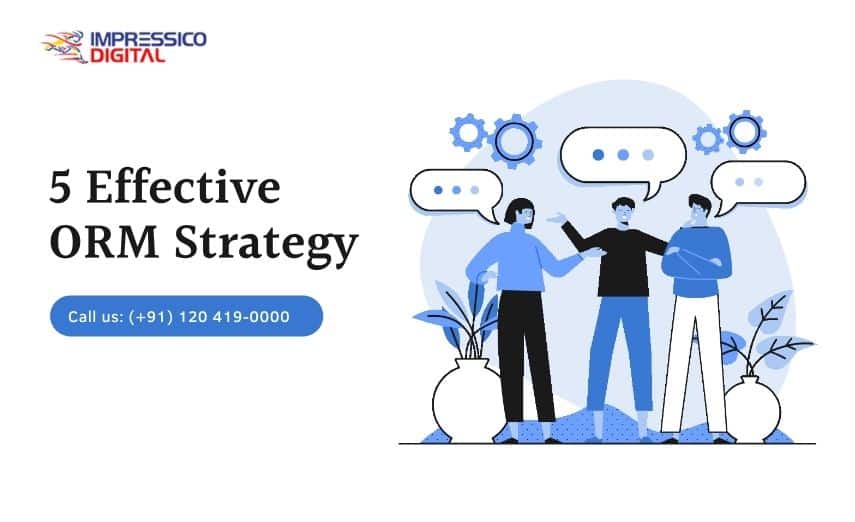5 Effective ORM StrategyAccording to research, 97% of business owners believe that online reputation management or ORM is crucial for maintaining a good online reputation.
Now the question arises how do you incorporate an online reputation management company with other management work? How to create an effective ORM strategy?
5 Steps of an Effective ORM Strategy:
Here are the five steps of an effective ORM strategy. Keep reading to learn the approach for sustained success. It can help shape the conversation around your brand to be as positive as possible.
1. Reputation Research
A reputation management company researches to understand the current public perception surrounding your brand. The Internet has made it easier to search for what people are talking about your company. Before research, make a list of all parameters to get an insight into the company’s reputation.
Start with your company name, key titles, and major products or services. Run multiple searches using major keywords and make a record of what people are saying.
Then, research to optimize your online ranking. Check for these factors:
- Is your website indexed?
- Is there any Google penalty against your website?
- Have you used backlinks?
Be up to date on Twitter, LinkedIn, Facebook, and Youtube. Add social media buttons to your website so users can easily access those profiles.
It will increase your chance of appearing on Search Engine Results Pages (SERPs) and push lower any negative feedback.
You should also know where your target audience is responding more. You should focus the majority of your research there. You should monitor reviews on e-commerce sites as well.
ORM company knows tactics to eliminate negative content from Google search results. They can file a DCMA Takedown notice or suggest other legal reputation solutions.
However, for the most part, your agency will collaborate with you to turn the negatives into positives. It could include assisting you in developing a more effective response strategy or bringing down the negative review.
2. Creating a Response Plan
An online reputation management company plan how to respond to the information gathered. They will monitor your online presence and suggest a response. They will suggest ways to respond to potential issues or questions.
3. Setting Framework for Negative Reviews
A reputation management company considers negative reviews and low feedback scores a unique opportunity to change someone’s mind. You can impress and win over your hardest critics. Receive feedback with an open mind, as it can truly improve your business.
Online reputation management services can walk you through a step-by-step process and help you maintain a polite, friendly, and professional tone, even when tensions rise.
Listen to the complaint and take action to resolve it. Rather than taking anything personally, take a step back and reconsider how it can help your business image.
4. Accentuate a Positive Image
Never pass a positive review over your desk. Negative review help in the improvement and a positive review can bring an even greater avalanche of customer satisfaction.
The 1/9/90 rule can help in Online Profile Management. On social media, only 1 % actively create content, 9% contribute moderately, and 90% are content absorbers and do not contribute to it. You have to focus on those 90% content absorbers. Enhance your social media profile with creative and informative content.
Ask for honest feedback on how they perceive your brand.
5. Adapt and Monitor Results
Offer a promotional code to an unhappy client. Try to bring products or services as per the claim. It will cultivate trust in your brand. Your responses should be realistic towards negative feedback.
You can take online reputation management services to move your reputation in an upward motion.
Use monitoring tools to check your reputation score. When you observe 50% satisfaction transforming to 75% satisfaction, you’ll know that you’re heading in the right direction.
ALSO Read: Shopify SEO Agency: Boost Your Organic Traffic & ROI
Facebook has Facebook Insights for integrated analysis capabilities. With a few clicks, you can monitor the response to each post. It can be a valuable tool for determining which types of content your target audience prefers.
It takes a concerted effort and a focused strategy to develop a successful brand reputation. It revolves around listening to what others say about you and taking steps to take the conversation in a positive direction.



